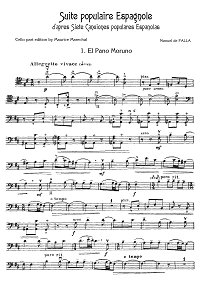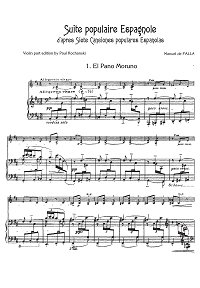Falla Manuel - Suite Populaire Espagnole for cello
Falla Manuel - Suite Populaire Espagnole for cello. You can download the PDF sheet music Falla Manuel - Suite Populaire Espagnole for cello on this page. Suite Populaire Espagnole is a 1914 set of traditional Spanish songs arranged for soprano and piano by the composer Manuel de Falla. Besides being Falla's most-arranged composition and one of his most popular, it is one of the most frequently performed sets of Spanish-language art songs. The set was dedicated to Madame Ida Godebska. The styles and provenance of the songs are strikingly diverse. They are from different parts of Spain: an asturiana is from Asturias, in the north; the seguidilla, a type of flamenco, from Murcia, in the southeast. "Nana" is a lullaby, and "Polo" a wild desire for revenge on an unfaithful lover. All the texts deal with love and the courting process, whether playfully, seriously, or tragically. The first song, for example, clearly alludes to the importance of virginity to a girl's value on the marriage market. The lullaby deals with love's outcome. Cello part edition by Maurice Marechal.
Content:
- El paño moruno (The Moorish Cloth)
- Nana
- Canción
- Polo
- Asturiana
- Jota
To download PDF, click the "Download PDF" button below the appropriate sheet music image.
To view the first page of Falla Manuel - Suite Populaire Espagnole for cello click the music sheet image. |
| PDF format sheet music |
|
|
|
Instrument part: 8 pages. 3454 K
|
Piano part: 24 pages. 8148 K
|
 |
 |
|
|
| Download PDF (14.99
€) |
Download PDF (14.99
€) |
|
|
The Suite populaire espagnole was originally conceived as a collection of folksong settings for voice and piano with the simple title of Siete canciones populares españolas. Falla composed them at the request of a Spanish singer who had participated in the highly successful production of his one-act opera La vida breve at the Opéra-Comique, Paris, in 1913. It was natural that Falla in Paris should turn to the rich folksong tradition of his native Spain, and the songs were completed before he left for Madrid the following year. Both words and melodies are traditional, and Falla added the accompaniments with his customary fastidious attention to detail, the characteristic harmony subtly deriving from the tunes themselves. The suite takes six of the original seven songs; on this recording they are played in the order of the vocal original. 'El paño moruno' (The Moorish cloth) comes from Murcia, and contrasts with the 'Asturiana', a gentle lament from northern Spain, and the lively Aragonese 'Jota', which has one of the most distinctive of Spanish dance rhythms. Falla was brought up in Andalusia and may well have heard the Andalusian 'Nana' (or lullaby) as a child. The 'Canción' is a love song, pensive in tone and elegant in expression, and contrasts vividly with the fiery Andalusian 'Polo', with its heavily accented, guitar-like accompaniment and melodic ornaments reminiscent of the cante hondo singing style of the Andalusian gipsy.
Manuel de Falla was a Spanish composer. With Isaac Albéniz and Enrique Granados, he was one of Spain's most important musicians of the first half of the 20th century. He wrote Siete canciones populares españolas, which he finished in mid-1914.
|
|